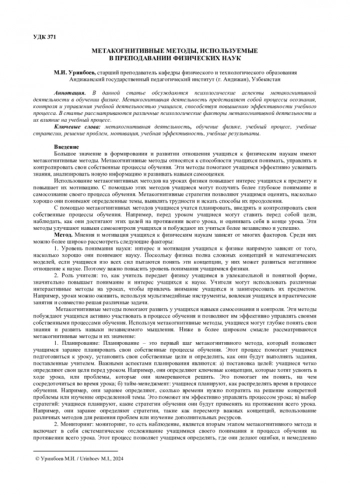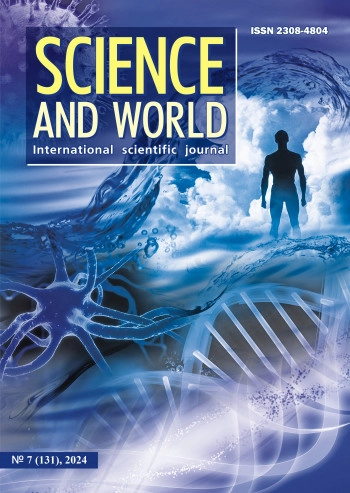В данной статье обсуждаются психологические аспекты метакогнитивной деятельности в обучении физике. Метакогнитивная деятельность представляет собой процессы осознания, контроля и управления учебной деятельностью учащихся, способствуя повышению эффективности учебного процесса. В статье рассматриваются различные психологические факторы метакогнитивной деятельности и их влияние на учебный процесс.
Идентификаторы и классификаторы
- Anderson, L.W., Krathwohl, D.R. A Taxonomy for Learning, Teaching, and Assessing: A Revision of Bloom’s Taxonomy of Educational Objectives. Allyn & Bacon. – 2001.
- Desoete, A. “Evaluating and Improving the Mathematics Teaching-Learning Process Through Metacognition.” Electronic Journal of Research in Educational Psychology. – 2007. – 5(3). – Pp. 705-730.
- Flavell, J.H. “Metacognition and Cognitive Monitoring: A New Area of Cognitive-Developmental Inquiry.” American Psychologist. – 1979. – 34(10). – Pp. 906-911.
- Schraw, G., Moshman, D. “Metacognitive Theories.” Educational Psychology Review. – 1995. – 7(4). – Pp. 351-371.
- White, B.Y., Frederiksen, J.R. “Inquiry, Modeling, and Metacognition: Making Science Accessible to All Students.” Cognition and Instruction. – 1998. – 16(1). – Pp. 3-118.
- Zohar, A., Ben David, A. “Explicit Teaching of Metastrategic Knowledge in Authentic Classroom Situations.” Metacognition and Learning. – 2008. – 3(1). – Pp. 59-82.
- Anderson, L.W., Krathwohl, D.R. A Taxonomy for Learning, Teaching, and Assessing: A Revision of Bloom’s Taxonomy of Educational Objectives. Allyn & Bacon. – 2001.
- Desoete, A. “Evaluating and Improving the Mathematics Teaching-Learning Process Through Metacognition.” Electronic Journal of Research in Educational Psychology. – 2007. – 5(3). – Pp. 705-730.
- Flavell, J.H. “Metacognition and Cognitive Monitoring: A New Area of Cognitive-Developmental Inquiry.” American Psychologist. – 1979. – 34(10). – Pp. 906-911.
- Schraw, G., Moshman, D. “Metacognitive Theories.” Educational Psychology Review. – 1995. – 7(4). – Pp. 351-371.
- White, B.Y., Frederiksen, J.R. “Inquiry, Modeling, and Metacognition: Making Science Accessible to All Students.” Cognition and Instruction. – 1998. – 16(1). – Pp. 3-118.
- Zohar, A., Ben David, A. “Explicit Teaching of Metastrategic Knowledge in Authentic Classroom Situations.” Metacognition and Learning. – 2008. – 3(1). – Pp. 59-82.
- Anderson, L.W., Krathwohl, D.R. A Taxonomy for Learning, Teaching, and Assessing: A Revision of Bloom’s Taxonomy of Educational Objectives. Allyn & Bacon. – 2001.
- Desoete, A. “Evaluating and Improving the Mathematics Teaching-Learning Process Through Metacognition.” Electronic Journal of Research in Educational Psychology. – 2007. – 5(3). – Pp. 705-730.
- Flavell, J.H. “Metacognition and Cognitive Monitoring: A New Area of Cognitive-Developmental Inquiry.” American Psychologist. – 1979. – 34(10). – Pp. 906-911.
- Schraw, G., Moshman, D. “Metacognitive Theories.” Educational Psychology Review. – 1995. – 7(4). – Pp. 351-371.
- White, B.Y., Frederiksen, J.R. “Inquiry, Modeling, and Metacognition: Making Science Accessible to All Students.” Cognition and Instruction. – 1998. – 16(1). – Pp. 3-118.
- Zohar, A., Ben David, A. “Explicit Teaching of Metastrategic Knowledge in Authentic Classroom Situations.” Metacognition and Learning. – 2008. – 3(1). – Pp. 59-82.









